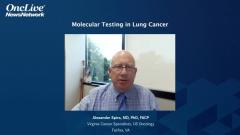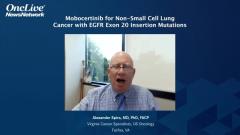
Non–small Cell Lung Cancer With EGFR Exon 20 Insertion
Rare drivers such as EGFR exon 20 insertions and what they mean for treatment of patients with metastatic non–small cell lung cancer.
Episodes in this series

Mark A. Socinski, MD: The exon 20 insertion mutations we know do not have any substantial sensitivity to available EGFR TKIs [tyrosine kinase inhibitors]. Therefore, the standard treatment up front of these patients has historically been platinum-based chemotherapies with or without bevacizumab. It’s controversial whether immunotherapy provides much benefit to this group of patients. There has been such an advance in the sensitivity mutations of using drugs like osimertinib and other drugs over the past decade or so because those patients with sensitizing mutations have great sensitivity to these orally administered TKIs. Obviously, exon 20 insertions don’t fall into those group of patients who have sensitivity to the available TKIs, so it has been an unmet need in this population. Recently, we’ve had the approval of amivantamab in the second-line setting following platinum failure in that setting. That’s a step in the right direction, but certainly I think there are a lot of unmet needs in this population and new ideas are needed.
TRANSCRIPT EDITED FOR CLARITY


















































